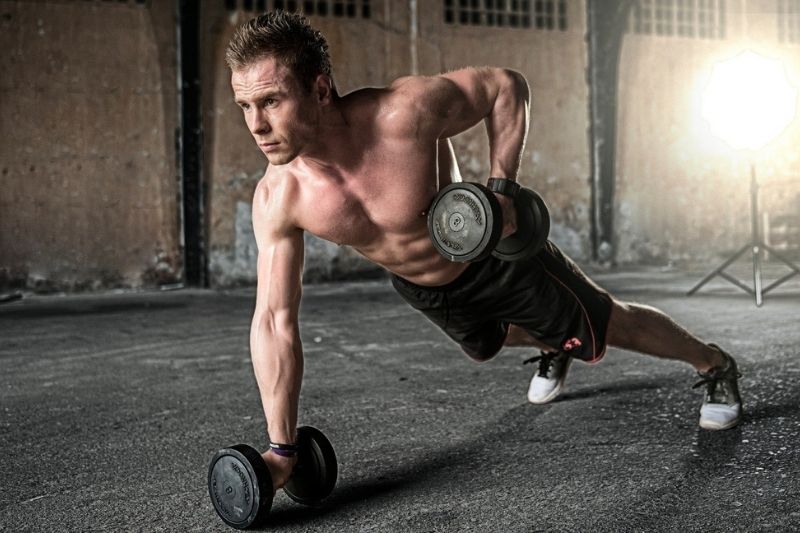No products in the cart.
6 Tips for Helping Your Body Recover from Exercising

Staying active is a critical part of staying healthy. As many as 23 percent of adults in the United States meet the weekly exercise requirement recommended, according to the Centers for Disease Control and Prevention’s National Center for Health Statistics. However, there are risks to exercising too much or working out unprepared. (Image Credit: StockSnap/Pixabay)
According to one report, over 520,000 people in the United States from all age ranges suffered some form of injury while exercising with or without any equipment. If you exercise regularly or plan to start doing so, you need to understand that your body has limits. You need to protect it from too much strain and help it recover from exertion.
The following tips will help you avoid injuring yourself when exercising and ensure your body heals quickly after a workout.
1. Eat Well
After a workout, your body needs certain vitamins and nutrients to help repair itself. Carbohydrates are essential in replacing the energy you’ve expended during your workout. Excellent sources of carbohydrates include potatoes, chocolate milk, and fruits. Proteins are another essential nutrient for building better muscles. Aside from protein powders, eggs, yogurt, and meat are primary sources of this nutrient. The faster your body can absorb these nutrients, the quicker your body can begin rebuilding. That’s why smoothies and protein shakes are popular among athletic types.
You could also take recovery supplements containing a combination of essential vitamins and minerals to enhance your body’s ability to heal. Do your research and find a muscle recovery supplement with a combination of vitamins such as B-12, iron, and zinc. These minerals are essential in helping your body heal from physical exertion after a workout. Joint support supplements also help keep your joints healthy and reduce the discomfort caused by intense workouts.
2. Warm Up
Your muscles need time to stretch before you begin working out. Your body performs physical activities better when your core temperature is up. Warmups also increase your blood flow, delivering oxygen to your muscles quicker and preventing them from cramping or seizing up prematurely.
Before you begin exercising, do a few minutes’ worths of warmups. Ideal warmups include jogging in place, stretching your muscles, and jumping jacks. Warmups also help put your mind into a state of readiness for physical activity, ensuring you have the mindset to make it through your exercise routine.
3. Wear the Right Outfit
The right clothes and accessories are instrumental in ensuring you don’t strain yourself. Exercise outfits have nifty features that make it easier for you to complete your workouts and support your body. The correct type of socks and shoes prevent you from slipping on roads or getting friction burns on your feet. (Image Credit: Lograstudio/Pixabay)
Even the material of your attire is important. Breathable fabrics like cotton and the like help keep your body temperature down while you exercise, preventing you from dehydrating or suffering from heat exhaustion. Moisture wicking fabrics prevent you from sweating too much by helping it evaporate quicker. Wear the right clothes for your workout and enjoy completing your routine safely and comfortably.
4. Loosen Up After
You should also take care of your body after you’re done working out. Ease the sore spots and knots in your muscles with a combination of massages and visits to a professional chiropractor. Massages and similar activity help stimulate blood flow to muscles after a workout. This helps your muscles get much-needed oxygen and nutrients. These are essential in ensuring your body rebuilds them stronger. Massages also help release tension from your joints, restoring movement and flexibility, especially after particularly intense or prolonged workouts.
5. Hydrate
Keeping your body hydrated during and after you exercise is crucial in enhancing your recovery. Staying hydrated when working out ensures your joints and muscles are well-lubricated and prevent joint pain or discomfort. Water helps your body cool down during exercise, ensuring you can continue with your routine without getting too hot to function. Drinking plenty of fluids after your workout replenishes the water your body lost through perspiration. Hydration is also crucial in facilitating all metabolic functions in your body and assists in transferring nutrients.
6. Take a Break
You don’t want to overtax your body by exercising too much. That can cause significant strain to your muscle and can even lead to debilitating injuries. If your body aches and hurts after an intensive workout, don’t just take medication and wonder how long it takes for ibuprofen to work. When your body hurts, that means it’s time to take a break. (Image Credit: Jim De Ramos/Pexels)
After a day of intensive workouts, schedule some light physical activity for the next day, such as swimming or brisk walking. If you’re experiencing discomfort even after a day of light exercise, don’t exercise the following day. Give your body time to heal and rebuild its muscles stronger than ever.
Physical activity and exercise are essential, but too much of a good thing can lead to bad things. These tips will help you take care of your body before and after you work out, ensuring you stay fit without injury.

















Leave a Reply